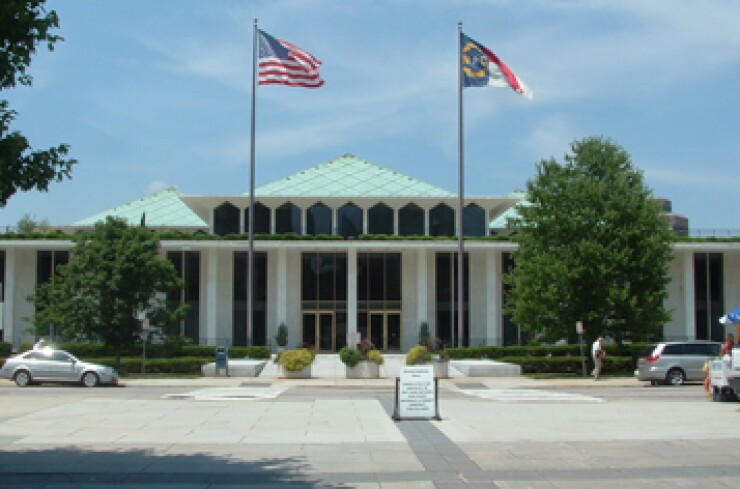
BRADENTON, Fla. - North Carolina, one of four states with overdue budgets, plans to put the final touch on its spending plans by the end of the week.
Tar Heel state legislators believe they have ironed out a compromise on the biennial pact that was due July 1.
Illinois, New Hampshire, and Pennsylvania still don't have budgets.
For states that approved budgets on time, most focused on education as a top funding priority, according to a Sept. 3 review by the National Association of State Budget Officers.
"Healthcare spending is also slated to increase in most states, although fewer states enacted widespread changes to their healthcare system than in recent years," the NASBO report said. "Many states also placed a renewed emphasis on infrastructure and transportation this year, with several revising their revenue structure through increasing gas taxes or other measures."
Education and transportation funding were also among the thorny issues that prevented the Republican-controlled North Carolina General Assembly from adopting the state's budget on time.
On Monday, legislators unveiled a compromise spending plan nearly three months late.
The necessary final votes on the state's general fund budgets - $21.7 billion for fiscal 2016 and $21.9 billion for 2017 - are anticipated by Friday.
The timing will be tight before money to fund government runs out.
Gov. Pat McCrory, a Republican, has not commented on the release of the budget. He could have just hours to sign it into law before state's third continuing resolution expires late Friday.
Highlights of the spending plan include placing $179.7 million into total statewide reserves in the current, fiscal 2016 budget and $426.2 million in 2017.
Education funding would rise, including a boost in starting teacher's pay to $35,000 from $33,000.
Individual and corporate income tax rates would drop slightly, while adjustments in state sales tax distributions would bring more income to rural and small counties due to the first-time application of the tax to the installation of appliances and vehicle repairs.
The budget would also end the annual $216 million transfer from the highway trust fund to the general fund so that, all together, changes in the transportation formula would add another $705 million to spending.
The transportation trust fund, if approved by McCrory, would be funded at $1.31 billion this year and $1.33 billion in 2017.
To support some of the increases in the budget, lawmakers approved raising the cost of a driver's license to $40 from $32. Vehicle registration renewals will rise to $66 from $51.
"I am grateful to members of the Senate and House for their hard work in reaching a final budget agreement that is fiscally smart, sustainable and saves for the future while still investing hundreds of millions of dollars for real needs in public education, public safety and transportation," State Senate President Pro Tem Phil Berger, R-Rockingham, said Monday when the budget compromise was unveiled.
The 429-page budget includes $25 million for debt service in fiscal 2017 to begin payments on McCrory's landmark $2.86 billion Connect North Carolina general obligation bond initiative if approved by voters.
As of Wednesday, House Bill 943, which would enable the bond program, remained stuck in the Senate Ways & Means committee where it landed on Aug. 10.
It was passed by the House on Aug. 6 by a vote of 76-29.
If HB 943 passes before the session ends, voters statewide would be asked to approve the issuance of the 40-year GO bonds during next year's presidential preference primary.
Bond proceeds would be spent across North Carolina to fund state-owned public facilities, related infrastructure, new and renovated highways, roads, bridges.
Lawmakers passed three continuing resolutions to keep government running as they worked out budget issues over education and health care funding, as well as funding McCrory's bond program.
On Wednesday, the North Carolina Justice Center urged McCrory in a letter to veto the budget largely because it authorizes income tax reductions.
"At a critical point in the economic recovery, it is time for North Carolina to replace the worst of the cuts made during the Great Recession, ensure our tax code is able to meet the needs of a state seeking to lead in the South and the nation, and consider the smart, sustainable public investments needed to support our competitive position," the nonprofit anti-poverty organization's letter said.
According to the group, planned tax reductions would reduce state revenue by more than $700 million when fully implemented "posing an unrealistic and unsustainable loss for public schools, universities, public health programs, the justice system, and rural economic development."
In Alabama, legislators are also resolving differences on how to fund the state's budget for the year that begins Oct. 1.
Lawmakers are in their second special session this week and reached agreement on several key measures to increase general fund revenues.
On Tuesday, the House and Senate voted to permanently transfer $80 million from the separately funded education budget to stabilize revenue income for the general fund.
The chambers also voted to increase the tax on cigarettes by 25 cents a pack to 67.5 cents.
Alabama lawmakers still must resolve difference over specific budget items, including Medicaid and corrections.
In June, Republican Gov. Robert Bentley vetoed the budget the GOP-controlled legislature approved during the regular session saying that it would cut government services too deeply.
Bentley said an additional $200 million to $300 million is needed to fund budget needs.
The governor said he would be inclined to sign the budget if the final version produced by lawmakers includes the additional revenue measures.
If Alabama's budget is not signed by Oct. 1, the state could face difficulties as it does not have a process for adopting a continuing resolution to fund government services.





